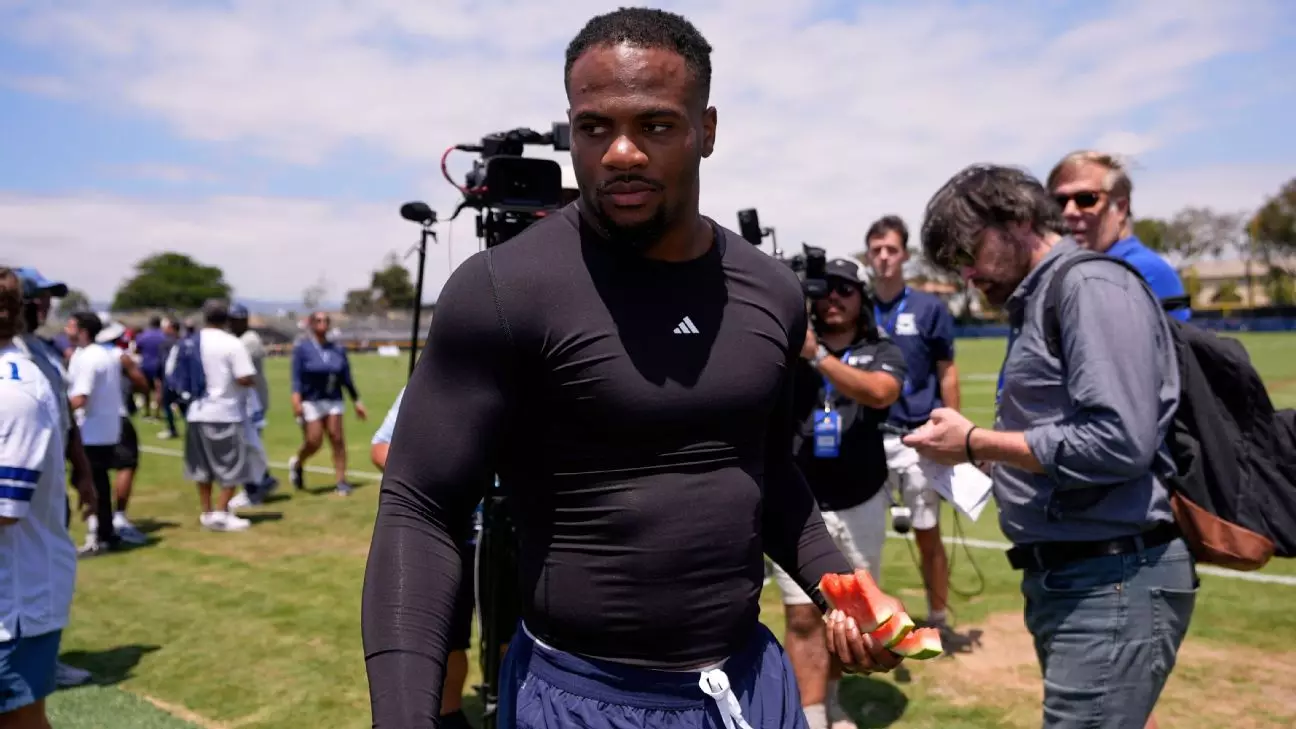In professional football, the outcome of a season often hinges on more than just talent—it depends on timely motivation, strategic planning, and the stability of key players. The Dallas Cowboys find themselves in an intriguing predicament, balancing optimism about Micah Parsons’ physical readiness with the complexities of contract negotiations that remain unresolved. Despite the lack of an official extension, team leadership exudes unwavering confidence that Parsons will be available when it counts most—on the field against the Philadelphia Eagles in the season opener. This situation reflects a broader truth in the NFL: talent alone isn’t sufficient; mental resilience, strategic patience, and organizational unity are equally vital.
What’s particularly compelling is the narrative surrounding Parsons’ physical health and mental preparedness. His absence from formal practices due to back tightness has sparked speculation, but the coaching staff’s optimistic outlook suggests a deeper understanding of Parsons’ professionalism and self-care. This isn’t merely about contractual leverage or monetary negotiations—it’s a testament to Parsons’ intrinsic dedication and the trust the organization places in his ability to return to peak form.
The Psychological Edge of Confidence and Preparation
While contract talks have stalled, there’s a strong belief that Parsons’ absence from full practice won’t tarnish his performance when it truly matters. Coach Brian Schottenheimer has highlighted Parsons’ exceptional self-awareness and physical upkeep. Parsons’ practice of attending walkthroughs and team meetings despite not participating in full drills indicates a smart approach to injury management—one that balances physical caution with mental engagement. His understanding of defensive schemes and communication skills during meetings can serve as a strategic advantage, allowing him to hit the ground running when he finally returns to full practice.
This demonstrates a nuanced appreciation for the importance of psychological readiness. It isn’t solely about physical participation; it’s about maintaining mental sharpness and team cohesion. Parsons embodies this principle perfectly—a player who, despite physical setbacks or contract uncertainty, retains focus, confidence, and a determination to perform. Coach Schottenheimer’s belief in Parsons’ preparedness underscores an essential truth: in football, mental resilience can compensate for some physical limitations, especially when the player himself has a deep awareness of his body’s state.
Contract Negotiation: A Battle of Patience and Future Dominance
The ongoing contract deadlock between Parsons, his agent, and the Cowboys reveals a complex negotiation landscape that transcends simple monetary figures. Owner Jerry Jones’s assertion that an agreement was “close” in March contrasts sharply with the apparent pause in discussions since then. Parsons, set to earn over $21 million this season under the fifth-year option, occupies a pivotal role in the team’s future plans—his potential as a game-changer on defense makes his long-term contract a strategic priority.
Negotiations in high-stakes environments often mirror games of patience and tactical positioning. The Cowboys’ approach suggests an understanding that rushing a deal could backfire, potentially destabilizing Parsons’ focus or underscoring a lack of confidence. Instead, they appear to wait for the right moment—possibly after roster cuts or when more information about Parsons’ health and on-field readiness becomes available. This delicate dance highlights a broader truth: in sports, patience and strategic timing can be more valuable than immediate concessions.
The Implications for the Cowboys’ Defensive Strategy
Parsons’ situation isn’t only a matter of his health or contract status—it directly impacts how the Cowboys will craft their roster. The potential need to keep an extra pass rusher reflects the team’s tactical flexibility. Schottenheimer’s acknowledgment that Parsons’ availability influences decisions reveals how central he is to the team’s defensive plans. The coaching staff’s confidence, paired with uncertainty about his on-field participation, pushes the team to prepare for multiple scenarios—whether Parsons is fully fit or needs additional recovery time.
This flexibility may serve the Cowboys well, enabling them to adapt their game plan with or without Parsons in the lineup. Yet, it also underscores the importance of Jonathan Parsons’ role as more than just a star—it’s a strategic asset that could sway roster construction and game-day tactics. His presence, mental readiness, and physical fitness are intertwined factors that could shape the outcome of their season.
What emerges from this narrative is a portrait of resilience—both from Parsons and the Cowboys organization. Despite contract disputes, physical setbacks, and the natural uncertainties of a football season, confidence persists. Parsons’ meticulous self-care and the coaching staff’s trust in his professionalism suggest that leadership believes this star defender will rise to the occasion when it truly counts.
The true test, however, lies in whether Parsons can maintain this high level of readiness amidst the pressure of negotiations and the physical toll of the sport. The Cowboys’ approach exemplifies a strategic patience rooted in faith—faith in Parsons’ talent, character, and ability to deliver under adversity. In the grand landscape of football, such unwavering confidence often tip the scales between championship success and mid-season struggles.

